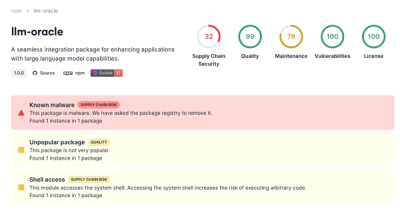




Standard, framework-agnostic HTTP interfaces for JavaScript servers and clients.
Installation
npm install servie --save
Usage
Servie
Base HTTP class for common request and response logic.
import { Servie } from 'servie'
Options
events? An instance of EventEmitterheaders? An instance of Headerstrailer? An instance of Promise<Headers>body? An instance of Body
Properties
events An event emitter for listening to the request and response lifecycleheaders The headers as a Headers instancetrailer A promise that resolves to a Headers instancebody The request or response payloadstarted Boolean indicating if a request/response has startedfinished Boolean indicating if a request/response has finishedbytesTransferred The number of bytes sent in the HTTP request/responseallHeaders Combined Request and Body headers instance
Methods
abort(): boolean Aborts the HTTP connectionclone(): Servie Abstract method implemented by Request and Response to clone new instance (throws TypeError when started == true)
Events
started when started == truefinished when finished == trueprogress when bytesTransferred incrementsconnection when Request connection is availableabort when Request or Response is abortingaborted when Request or Response sets aborted == true
Request
HTTP class for encapsulating a Request, extends Servie.
import { Request } from 'servie'
Options
const request = new Request({
url: '/',
method: 'GET'
})
Extends Servie options.
url The HTTP request url (string)method? The HTTP request method (string, default: GET)connection? Connection information ({ remoteAddress?: string, remotePort?: number, localAddress?: string, localPort?: number, encrypted?: boolean })
Properties
url Requested url (string)method Requested method (string)Url Request url parsed into individual parts (object)connection HTTP connection information when available (object)
Events
abort Request aborted and transport MUST handleerror An out-of-band error occurred and transport MUST handleresponse The corresponding Response has startedconnection Emitted when connection information becomes available
Response
HTTP class for encapsulating a Response, extends Servie.
import { Response } from 'servie'
Options
const response = new Response({})
Extends Servie options.
statusCode? The HTTP response status code (number)statusMessage? The HTTP response status message (string)
Properties
statusCode The HTTP response status code (number)statusMessage? The HTTP response status message (string)ok Returns whether response was successful (status in range 200-299) (boolean)
Used by Servie for Request, Response and Body objects.
import { Headers, createHeaders } from 'servie'
Options
const headers = createHeaders(...)
Create Headers instance from raw value (e.g. HeadersObject | string[] | null).
Properties
rawHeaders The raw HTTP headers list (string[])
Methods
set(name: string, value: string | string[]): this Set a HTTP header by overriding case-insensitive headers of the same nameappend(name: string, value: string | string[]): this Append a HTTP headerget(name: string): string | undefined Retrieve a case-insensitive HTTP headergetAll(name: string): string[] Retrieve a list of matching case-insensitive HTTP headershas(name: string): boolean Check if a case-insensitive header is already setdelete(name: string): this Delete a case-insensitive headerasObject(toLower?: boolean): HeadersObject Return the headers as a plain objectextend(obj: HeadersObject): this Extends the current headers with an objectkeys() Iterable of the available header namesvalues() Iterable of header valuesentries() Iterable of headers as [key, value]clear() Clears the headers instanceclone() Clones the Headers instance
Static Methods
is(obj: any): boolean Checks if an object is Headers
Body
Immutable representation of the body used by Request and Response.
import { Body, createBody } from 'servie/dist/body/{node,browser,universal}'
Body is a complex part of Servie due to support for browsers and node.js together. TypeScript is also missing a good story for universal modules with code paths offering different features (e.g. streams in node.js, native ReadableStream in browsers), so it's required that you import a specific version for your environment.
Note: Each endpoint (body/node, body/browser, body/universal) offers the same basic API (Body, createBody). Universal relies on module bundlers (e.g. webpack) and package.json#browser to switch the node.js API with the browser API at bundle time. TypeScript will require dom types since the interface returns a union of possible bodies (node and browser).
Options
const body = createBody(...)
Create a Body instance from raw data (e.g. Readable | ReadableStream | Buffer | ArrayBuffer | object | string | null).
Properties
buffered Indicates the raw body is entirely in memory (boolean)bodyUsed Indicates the body has been read (boolean)hasBody Indicates the body is not empty (boolean)headers Instance of body-related HTTP headers (Headers)
Methods
text(): Promise<string> Returns body as a UTF-8 stringjson(): Promise<any> Returns body parsed as JSONarrayBuffer(): Promise<ArrayBuffer> Returns the body as an ArrayBuffer instancebuffer(): Promise<Buffer> Returns the body as a Buffer instance (node.js)stream(): Readable Returns a readable node.js stream (node.js)readableStream(): ReadableStream Returns a readable WHATWG stream (browsers)clone(): this Clones the Body instance (allowing body re-use, throws TypeError when bodyUsed == true)
Static Methods
is(obj: any): boolean Checks if an object is Body
Implementers
If you're building the transports for Servie, there are some life cycle events you need to be aware of:
- Listen to the
error event on Request and Response for errors - Listen to the
abort event on Request to destroy the connection and, when destroyed, set req.aborted = true - Resolve
trailer promise and append to HTTP request or response - Set
started = true and finished = true on Request and Response (as appropriate) - Set
bytesTransferred on Request and Response with transfer progress - Set
req.closed = true when the connection has finished
JavaScript
This module is designed for ES2015 environments and published with TypeScript definitions on NPM.
License
Apache 2.0








